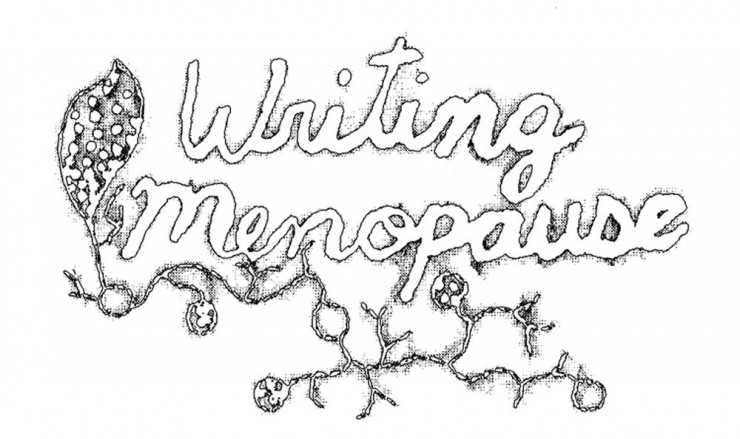Three paper presentations on Menopause at the 21st Biennial Conference of the Society for Menstrual Cycle Research at The Center for Women’s Health and Human Rights, June 4-6, 2015, Suffolk University, Boston will explore sexuality and the menopausal woman, as well as personal menopausal experiences as collected in a literary anthology.
1. Sex and the Menopausal Woman: Resisting Representations of the Abject Asexual Woman
Presented by Jane Ussher and Janette Perz, Centre for Health Research, School of Medicine, University of Western Sydney
Drawing on qualitative research conducted with women at midlife, and those who have experienced premature menopause after cancer, we argue that sexuality can continue to be a positive experience for women throughout adult life and into old age.
Medical discourse has traditionally positioned the menopausal transition as a time of sexual atrophy and loss of femininity, with hormonal replacement as the solution. In contrast, feminist critics have argued that women’s experience of sexual embodiment during menopause is culturally and relationally mediated, tied to discursive constructions of aging and sexuality, which are negotiated by women.
This paper will present a critical examination of women’s experiences of sexuality during and after the menopausal transition, drawing on in-depth one-to-one interviews we have conducted with 21 women at midlife, and 39 women who have experienced premature menopause as a consequence of cancer treatment.
Theoretical thematic analysis was used to identify three themes across the women’s accounts: ‘Intrapsychic negotiation of sexual and embodied change’; ‘Feeling sexy or frumpy: Body image and the male gaze’; ‘Indifference or desire? The relational context of sexuality during menopause’. Through this analysis, we challenge myths and misconceptions about the inevitability of sexual decline at menopause, as well as normalise the embodied changes that some women experience–whether menopause is premature, or occurs at midlife. We argue that sexual difficulties or disinterest reported by women during and after menopause are more strongly associated with psycho-social factors than hormonal status, in particular psychological well-being, relationship context and a woman’s negotiation of cultural constructions of sex, aging, and femininity. However, sexuality can continue to be a positive experience for women throughout adult life and into old age, with many menopausal women reporting increased sexual desire and response, as well as re-negotiation of sexual activities in the context of embodied change. This undermines the bio-medical construction of menopause as a time of inevitable sexual atrophy and decay.
 2. Writing Menopause: Creating an Anthology
2. Writing Menopause: Creating an Anthology
Presented by Jane Cawthorne and E. D. Morin
The editors will discuss their process of envisioning and creating a new literary anthology that considers the diverse experience of menopause from various points of view. The anthology is composed of new works of poetry, short fiction, interviews, creative non-fiction, and cross-genre pieces, along with several previously published creative works that were chosen to round out the collection.
Although the editors make no claims that this work is in any way definitive, their focus instead was to create a venue for more stories and to encourage a richer vocabulary about this important transition within a literary context. The editors have observed that few literary representations of menopause exist. They will explain how they arrived at wanting to create this collection, as well as the submission process, the criteria used in accepting submissions, and how the shape of the collection shifted organically with the nature of submissions received. They will reflect on what types of submissions they would not accept, what they think the volume says about menopause, and how their own ideas about menopause were changed during the process. A few excerpts will be read.
3. Sexuality and Post-Menopausal Women: Desirability and Desire
Presented by Maureen C. McHugh, and Camille J. Interligi, Department of Psychology, Indiana University of Pennsylvania
Ageist cultural messages portray old bodies as ugly, asexual and undesirable (Calasanti & Slevin, 2001; Furman, 1997), and yet not engaging in sufficient partner sex is viewed as a sexual dysfunction. How do contradictory cultural messages about the sexuality of older women impact their sense of themselves as sexual beings?
Aging threatens women’s sense of themselves as women, as sexual beings, and as sexually desirable (Clarke, 2011). Ageist cultural messages convey the cultural value placed on youthfulness and portray old bodies as ugly, asexual and undesirable (Calasanti & Slevin, 2001; Furman, 1997). Stereotyped as experiencing physical and sexual decline, and viewed as asexual, older women’s sexual interest may be deemed inappropriate. Yet not engaging in sufficient partner sex is seen as a dysfunction (McHugh, 2006). Who says how much sex is enough? How do contradictory cultural messages about the sexuality of older women impact their sense of themselves as sexual beings?
Limited research on older women’s sexual desire and desirability reflects an androcentric bias. Research has rarely addressed appearance concerns, or the embodied nature of older women’s experiences (Clarke, 2011). Research on older women’s sexuality has emphasized sexual declines, diseases, and dysfunctions. As the research on older women becomes less ageist, heteronormative and androcentric, we increasingly recognize the complexity and the contextual nature of women’s sexual desirability (Clark, 2011) and desire.
In this review of the sexual desirability and desire of older women, we address the complexity of women’s perspectives regarding their bodies, their appearance, and their sexual selves. We address the impact of contextual factors on women’s experience of themselves as sexual beings, including the larger socio-historical context of their lives, and the particular context in which they experience sexual desire ( e.g. the availability of a partner, and quality of their relationships). This analysis emphasizes women’s sexual desire as complicated and contextual; the potential of older women to be authentic and to negotiate sexual agency is examined.
Media Release for the 21st Biennial Conference of the Society for Menstrual Cycle Research at The Center for Women’s Health and Human Rights, June 4-6, 2015, Suffolk University Boston, USA
Register here for the Boston Conference.

